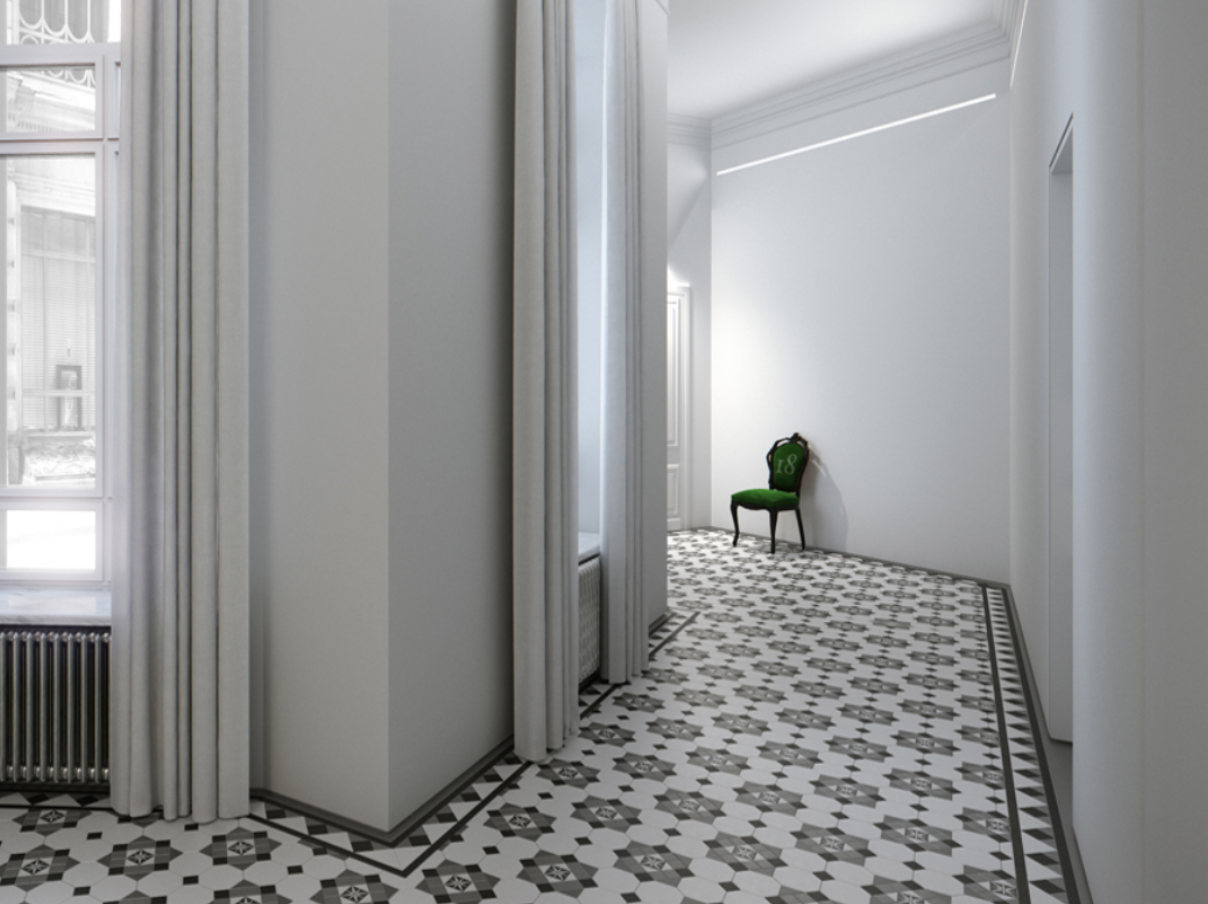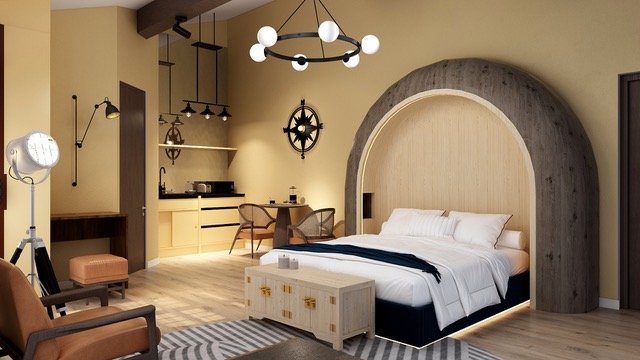What Are WOOLF Interior’s Top Five Hotel Design FAQ's ?
When we first meet a boutique hotel brand there are always five main questions that a new client will want to explore with WOOLF…
Award-winning studio WOOLF has been appointed to design the interiors of new hotel venture HOMETOO.
Located in Hamilton Square, Liverpool, the site has a rich Georgian history. Designed by Edinburgh architect James Gillespie Graham, the auspicious square boasts the greatest number of Grade I listed buildings in a square, outside of London. The site will be renovated into serviced spaces for short to long stays. A new ‘home from home’ hotel venture, from the ‘The Property Collective Group. Each space will be designed with an individual focus, referencing areas of Liverpool, offering guests a sense of community and connection. The design concept for the hotel interior has been born out of a detailed ‘Liverpool life’ market research campaign, commissioned by WOOLF Interior.
The room designs will draw upon contextual references, lively comfortable interiors, focused on entertainment and individual experiences. The rooms include a sports room (big football fanbase and proximity to the stadium); culture room (with references to artwork housed in the local galleries); nautical room (overlooking the river Mersey for visitors with an interest in the trade history and Titanic); music room (a fun 60’s 70’s Beatle-esque music styled room); business room (a long stay targeted room for business people to stay in - think great Zoom backgrounds).
WOOLF is designing the interiors shaped through an experiential lens as opposed to taking a conventional operational hotel approach. HOMETOO will offer guests elevated stays through service-on-demand, accessible via a digital experience. With fun characterful interiors, each serviced apartment will have an Instagram-able style, together with a personalised sense of belonging. Verity Woolf, design director and founder of WOOLF says ”as lead designers on this hotel project, we’re designing the interior schemes to ensure they work in tandem with the overall HOME TOO company brand as this project kicks starts its narrative.”
WOOLF Interior architecture & design - Belgravia House Hotel, London
WOOLF Interior architecture & design - Joinery design at Belgravia House Hotel
Question 1: How is your hotel design different to your competitors?
Personalisation:
Our studio moto is to ‘create hotels with unique personalities’. The design team at WOOLF always aims to create projects or provide consultancy advice with unique designs that showcase the client's personal style and personality. We don't want all hotels to feel the same. Each hotel should be different and designed to fit the brand's needs and value.
Attention to Detail:
Each of our interior designers will pay close attention to every detail in our projects. We strive to create hotel spaces that are not only aesthetically original but also functional and practical. The creation of detail in design is what makes our designers tick.
Collaboration:
Our team at Woolf Interior Architecture and Design believes that collaboration is key to creating successful design projects. We work closely with our brands to understand them from an operational and design perspective.
Sustainability:
Woolf Interior Architecture and Design is committed to creating sustainable designs that are environmentally friendly and socially responsible. We continually look for ways to incorporate sustainable materials and practices into our designs wherever possible.
Question 2: What Is your hotel specialism at WOOLF interior architecture and design ?
Creatively, our brand promises to ‘mix tradition and imagination to design contemporary and historic interiors’. We possess extensive experience in designing hotel interiors that list or have historic significance.
Our project work spans both boutique and commercial hotel projects.
We offer various design services for hotels, including architectural planning, interior design, furniture design, procurement, and project management - explore the hotel interior design project here.
Question 3: How can hiring a hotel interior designer, consultant or interior architect be beneficial?
Enhance guest experience:
A well-designed hotel can enhance the guest experience and leave a lasting impression. Professional designers can create a visually appealing and functional space that meets the needs of guests and reflects the hotel's brand identity.
Increase revenue:
A well-designed hotel can attract more guests and generate more revenue. Professional designers can create an attractive and welcoming environment that appeals to a broad range of customers and differentiates the hotel from competitors.
Optimise space utilisation:
Interior designers can enhance the use of rooms to ensure that every area of the hotel is utilised effectively. This can result in more efficient and functional use of space, increased capacity, and improved flow of guests and staff.
Ensure compliance with regulations:
Interior architects can ensure that the hotel design follows local building codes and regulations. This can help avoid costly fines and legal issues that may arise from non-compliance.
Save time and money:
Professional designers can help streamline the design process, reduce mistakes and errors, avoiding costly delays. They can also help manage budgets and ensure that the project stays on track and within the allocated budget.
Hiring a hotel consultant, interior architect or designer can help create a hotel that is not only visually appealing but also functional, efficient, and compliant with regulations, which can ultimately result in increased revenue and customer satisfaction. Explore the hotel project
Question 4: How will an interior architect benefit hotel design ?
TWO IN ONE - Technical expertise:
Interior architects have the skills to design hotel interiors that follow rules and are safe and structurally sound. They can collaborate with contractors, engineers, and other professionals to ensure that they implement the design correctly and safely.
Aesthetic vision:
They can help bring your aesthetic vision to life by creating a design concept that reflects your brand, target audience, and overall vision for the hotel. They can also help you choose materials, colors, and finishes that will enhance the overall look and feel of the hotel.
Functionality:
Interior architects can design hotel interiors that are functional and efficient. They can create a layout that maximizes the use of space, ensures smooth traffic flow, and meets the needs of hotel staff and guests.
Branding:
Design specialists will create a unique and memorable brand experience for your guests. They can create spaces that reflect your brand identity and messaging, creating a cohesive and immersive guest experience.
Increased revenue:
A well-designed hotel interior can increase revenue by attracting more guests and encouraging repeat business. Interior architects can design spaces that enhance guest comfort and satisfaction, leading to positive reviews and increased occupancy rates.
Hiring an interior architect for hotel design can create an outstanding, practical, and stunning design that matches your brand vision. They can turn your design ideas into reality, making sure it meets technical requirements and improves the guest experience. This can lead to a rise in bookings and a competitive edge in the hospitality industry.
Question 4: How does your hospitality Design process work?
Working with Woolf Interior Architecture and Design involves customised phases based on the RIBA work stages. Here is a general overview of our design process:
1. Initial Consultation:
The first step is an initial consultation, which can take place in person or virtually. During this meeting, the team at Woolf Interior Architecture and Design will discuss the client or brand’s needs, preferences, and goals for the project.
2. Design Concept:
After the initial consultation, the team will develop a design concept that reflects the client's or brand’s vision for the space. This concept may include sketches, renderings, and mood boards to help the client and other consultants, visualise the design.
3. Design Development:
Once the interior design concept has been approved, the team will develop the hotel interiors in more detail. This may involve selecting and specifying materials, finishes, and furnishings, as well as developing detailed drawings and plans.
4. Construction:
Once the design has been finalized, the team will manage the construction process. This may involve working with contractors and other professionals to ensure that the design is executed according to plan.
5. Installation:
Finally, the team will oversee the installation of furnishings and accessories, and style the spaces so that they are fully functional and ready for use.
Our team of interior designers will closely collaborate with the client to meet their needs and expectations. They will give updates on the project's progress and be there to answer any questions or concerns the client may have. Explore WOOLF hotel projects
Question 5: What sustainability values can we incorporate into hotel interior design?
Environmental impact:
Hotels can have a significant impact on the environment due to their energy and water consumption, waste generation, and carbon footprint. Sustainable interior design practices can help reduce this impact by using eco-friendly materials, energy-efficient systems, and renewable energy sources.
Guest preferences:
Many guests today are looking for sustainable hotels and are willing to pay more for eco-friendly options. Sustainable interior design can help hotels attract and retain environmentally conscious guests and improve their brand reputation.
Regulatory requirements:
Many countries and regions have regulations and standards related to sustainability and green building practices. Hotels that incorporate sustainable interior design practices can comply with these requirements and avoid legal issues and fines.
Cost savings:
Sustainable design saves money by using less energy and water, and reducing maintenance costs in the long run. This can help hotels become more efficient and profitable while reducing their environmental impact.
Overall, sustainability is an essential consideration in hotel interior design, as it can benefit the environment, guests, hotel owners, and the community. Hotels can become more eco-friendly by using sustainable design. This can also help them attract green guests and follow rules. Additionally, it can save them money in the long run.















